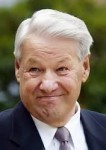 Boris Yeltsin (1931-2007) was a Soviet politician and the first democratically elected president of Russia. He is best known for short-circuiting the 1991 coup that briefly removed Mikhail Gorbachev from power. Born in a rural village near the Ural Mountains, Yeltsin’s family were victims of Stalin’s brutal agricultural policies during the 1930s. Yeltsin was raised in near poverty but proved an excellent student and sportsman. He received a technical education, qualifying as an engineer before becoming a construction supervisor. Yeltsin joined the Communist Party in 1961, a move that allowed him access to important government positions. By the mid-1970s Yeltsin was a party boss in Sverdlovsk. In 1977 he oversaw the demolition of the Ipatiev House, the building where Tsar Nicholas II and his family were executed in 1918.
Boris Yeltsin (1931-2007) was a Soviet politician and the first democratically elected president of Russia. He is best known for short-circuiting the 1991 coup that briefly removed Mikhail Gorbachev from power. Born in a rural village near the Ural Mountains, Yeltsin’s family were victims of Stalin’s brutal agricultural policies during the 1930s. Yeltsin was raised in near poverty but proved an excellent student and sportsman. He received a technical education, qualifying as an engineer before becoming a construction supervisor. Yeltsin joined the Communist Party in 1961, a move that allowed him access to important government positions. By the mid-1970s Yeltsin was a party boss in Sverdlovsk. In 1977 he oversaw the demolition of the Ipatiev House, the building where Tsar Nicholas II and his family were executed in 1918.
During the late 1970s, Yeltsin developed a working relationship and friendship with Mikhail Gorbachev. As Gorbachev ascended through the ranks of the Communist Party, so too did Yeltsin. In 1981 he became a member of the CPSU Central Committee; five years later he was admitted into the Politburo. Yeltsin was a skilled and determined political operator, prepared to do battle with entrenched elites in the Communist Party – but he was also erratic and unpredictable, to the extent that he was often accused of being drunk. Politically, Yeltsin was in favour of liberalisation and favoured reforms that went beyond Gorbachev’s glasnost and perestroika. His plainspokenness and his tough stance against corruption were also rare traits in a Soviet leader. As party boss in Moscow, Yelstin oversaw investigations into a range of problems, from public transport to store queues. This hands-on approach made very popular with ordinary Russians – but it also put Yeltsin on a collision course with conservatives in the Communist Party. This, along with Yeltsin’s demands for extensive reforms, culminated in his expulsion from the Politburo (1988) and his sensational resignation from the Communist Party (1990).
In June 1991 Boris Yeltsin stood as a candidate for the presidency of the Russian republic. He was elected president, winning 57 percent of the vote. In August, just a month after taking office, Yeltsin exploited his popularity to thwart an anti-Gorbachev coup led by communist hardliners. Climbing atop a tank outside the Soviet parliament building, Yeltsin appealed for the public to oppose the coup and for soldiers to abandon their support of it. Yeltsin went on to serve eight years as Russian president. His presidency was a period of radical economic reforms, political confrontations and clashes with communists. Yeltsin’s time in office was marred by criticisms and failures, though he is remembered for leading the creation of a new, more democratic Russia. Yeltsin went into retirement after his resignation in 1999, making only occasional public appearances or statements. He died of heart issues in April 2007 and was given a religious funeral, the first for a Russian leader since 1894.
Content on this page is © Alpha History 2018-23. This content may not be republished or distributed without permission. For more information please refer to our Terms of Use.
This page was written by Jennifer Llewellyn and Steve Thompson. To reference this page, use the following citation:
J. Llewellyn & S. Thompson, “Boris Yeltsin”, Alpha History, accessed [today’s date], https://alphahistory.com/coldwar/boris-yeltsin/.
